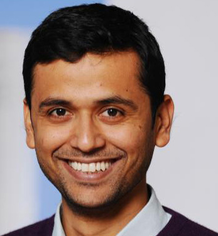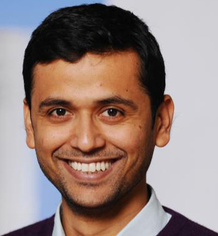Max Planck Institute for Chemistry broadens network to India
Scientists from Mainz and Chennai jointly explore health and climate impacts of aerosols
Germany and India are getting closer to each other: The Max Planck Society will support a new cooperative research program between Mainz and Chennai. Dr. Sachin S. Gunthe from the Indian Institute of Technology Madras in Chennai will lead the new partner group of the Max Planck Institute for Chemistry. The Indian-born scientist worked for five years as a postdoctoral research fellow at the institute in Mainz. As a member of Dr. Ulrich Pöschl’s group, Gunthe focused on the properties of atmospheric aerosols, i. e. airborne particles such as pollen and soot.

Eighteen months ago, Max Planck researcher Dr. Sachin S. Gunthe returned to his home country India. Since then, he has been working as an assistant professor at the Indian Institute of Technology Madras, Chennai in the Environmental and Water Resources Engineering division of the Civil engineering department. His areas of expertise are aerosol-cloud-precipitation interactions and characterizing the properties of atmospheric aerosols - research areas that optimally complement the research topics Dr. Ulrich Pöschl’s department is interested in. Thus, establishing the best conditions for a scientific partnership. “Our common research goal for the next three years is to explore biological aerosol particles and cloud condensation nuclei in response to various environmental and seasonal conditions in India. Above all, we want to learn more about their climatic and health effects,” states Ulrich Pöschl, Director of the Multiphase Chemistry Department at the Max Planck Institute for Chemistry.
“Aerosols of biological origin are a heterogeneous group providing a wide field of research,” says Sachin S. Gunthe. Recent studies, for example, have suggested a close relationship between biological aerosols and cloud formation. “We want to investigate which role they might play in the regional water cycle and how they help pathogens to spread. Finally, we aim to achieve a basic understanding of the organic aerosols’ importance for the Indian atmosphere,” explains the Indian researcher. Also involved in this project is Dr. Viviane Després of the Johannes Gutenberg University in Mainz, who examines related questions as part of the interdisciplinary Earth System Sciences Research Centre “Geocycles”.
The research partnership between Dr. Pöschl and Dr. Gunthe is the third of its kind at the Max Planck Institute for Chemistry. Both of the other Indian partner groups were led by Professor Jos Lelieveld, director of the Department of Atmospheric Chemistry. One of these was successfully completed at the end of 2011.
Overall, the Max Planck Society currently provides financial support to 49 partner groups in India, China, Central and Eastern Europe and South America. The objective is to attract outstanding young scientists as international partners after their time at a Max Planck Institute. In this way, joint research projects of the highest quality which are of interest to both countries will be promoted and strengthened. Prerequisite for the establishment of a partner group is an outstanding young scientist from abroad who, after having worked at a Max Planck Institute, returned to his home country and is again working for a well-known and powerful institution. Furthermore, his research topic must be of interest for the previous Max Planck host institute. Once founded, the scientific partnership lasts initially for three years. In the case of successful research it can be extended up to five years.
To launch the new partnership there will be a workshop from 6 to 7 March at the Indian Institute of Technology Madras in Chennai.
(AR)
